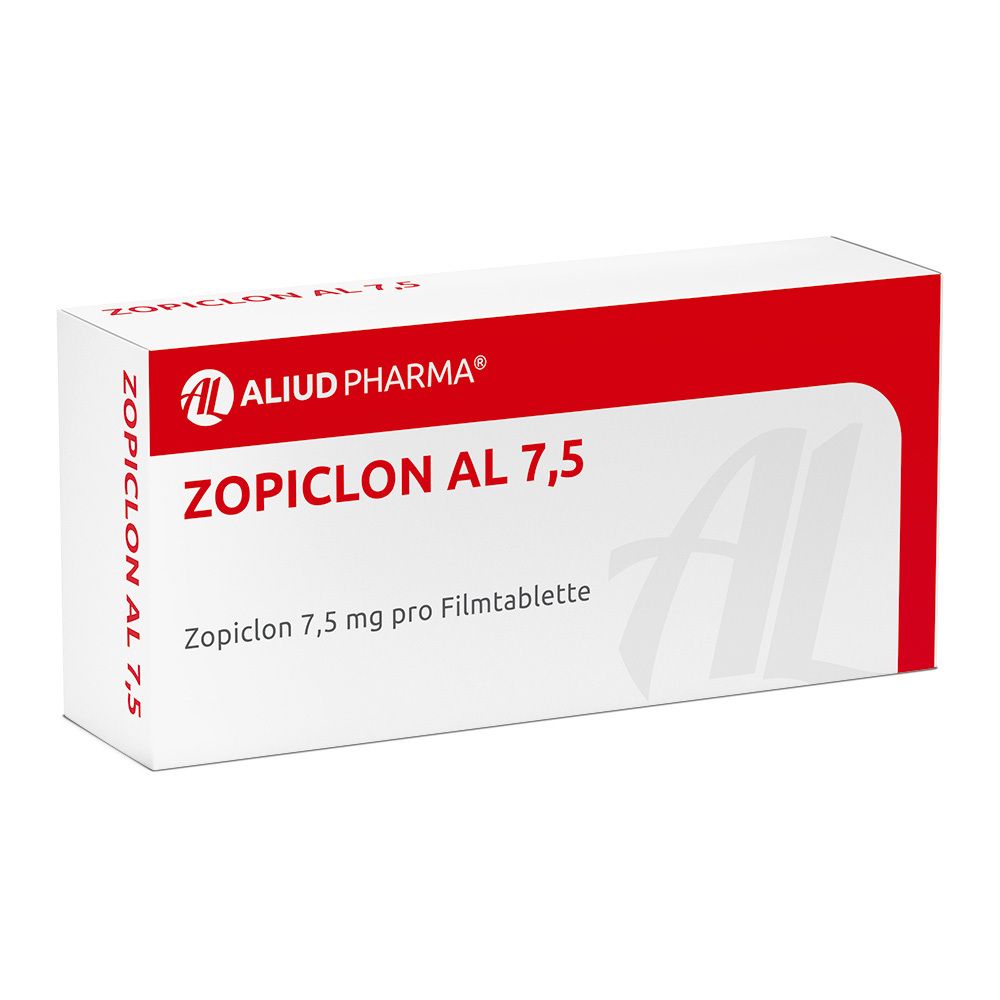Buy Zopiclon (Zopiclone) 7,5 mg
Zopiclone is a medication classified as a hypnotic or sedative. It is primarily used for the short-term treatment of insomnia, a sleep disorder characterized by difficulties in falling asleep, frequent awakenings during the night, or early morning. Zopiclona is commonly prescribed to assist individuals who struggle with initiating or maintaining sleep.What is Zopiclone
This medication is available in tablet form and is typically taken orally. Its mechanism of action involves targeting the central nervous system to enhance the effects of gamma-aminobutyric acid (GABA), a neurotransmitter. By increasing GABA activity, zopiclone produces a sedative effect, facilitating sleep initiation and improving sleep quality and duration for individuals experiencing insomnia. Zopiclone is generally prescribed for a limited duration, usually ranging from 2 to 4 weeks. It should not be used as a long-term solution for sleep problems. Typically, zopiclone is recommended when non-pharmacological approaches, such as lifestyle changes or cognitive-behavioral therapy, have proven ineffective in managing insomnia. It is crucial to note that zopiclone is a controlled substance and should only be taken under the guidance and prescription of a healthcare professional. Misuse or excessive use of the medication can lead to dependence, withdrawal symptoms, and other adverse effects. It is essential to adhere to the prescribed dosage of zopiclone and treatment duration to minimize potential risks.How Does Zopiclone Work?
Zopiclone functions by acting on the neurotransmitter system in the brain to induce sleep. It belongs to the cyclopyrrolone class of drugs, which are classified as central nervous system depressants. Zopiclone enhances the activity of GABA, a naturally occurring chemical in the brain that inhibits or slows down nerve cell activity. This increase in GABA activity produces a sedative effect, assisting individuals in falling asleep and staying asleep. GABA binds to specific receptors called GABA-A receptors in the brain. Zopiclone enhances the inhibitory effects of GABA by binding to a specific site on the GABA-A receptors. This binding leads to an influx of chloride ions into the nerve cells, hyperpolarizing them and reducing their likelihood of generating electrical signals. As a result, brain activity is calmed, leading to sedation, relaxation, and the facilitation of sleep. Zopiclone’s sedative properties make it effective in promoting the onset of sleep and improving sleep maintenance. However, it’s important to note that zopiclone should only be used for short-term treatment, as prolonged use can result in tolerance and dependence. It is always advisable to consult a healthcare professional before starting any sleep medication to determine the appropriate dosage and duration based on individual circumstances.Buy Zopiclone Online
Taking zopiclone properly is essential to ensure its effectiveness and minimize the risk of Zopiclone side effects. Here are some general guidelines on how to take zopiclone: Follow the prescribed dosage: Take zopiclone exactly as prescribed by your healthcare professional. The dosage can vary depending on individual factors, such as age, overall health, and the severity of insomnia. Never exceed the prescribed dose or take it more frequently than recommended. Take it before bedtime: Zopiclone is typically taken just before bedtime. This timing allows the medication to start working when you’re ready to sleep. It is essential to avoid taking it earlier in the evening or during the day to prevent excessive drowsiness or impairment. Swallow the tablet whole: Take the zopiclone tablet with a glass of water. Do not crush, break, or chew.
How do I Take Zopiclone?
To ensure the effectiveness of zopiclone and minimize the risk of side effects from Zopiclone, it is crucial to follow these general guidelines for its proper usage:- Adhere to the prescribed dosage: Take zopiclone exactly as directed by your healthcare professional. The dosage may vary based on individual factors such as age, overall health, and the severity of insomnia. It is important to never exceed the prescribed dose or take it more frequently than recommended.
- Take it before bedtime: Zopiclone is typically taken just before going to bed. This timing allows the medication to start working when you are ready to sleep. It is important to avoid taking it earlier in the evening or during the day to prevent excessive drowsiness or impairment.
- Swallow the tablet whole: Take the zopiclone tablet with a full glass of water. It should be swallowed as a whole without crushing, breaking, or chewing it. This ensures the medication is released and absorbed properly in your body.
- Avoid alcohol and other sedatives: It is essential to avoid consuming alcohol or taking other sedative medications while using zopiclone. These substances can intensify the sedative effects of zopiclone, leading to excessive drowsiness, impaired coordination, and other adverse effects.
- Follow the recommended duration of treatment: Zopiclone is typically prescribed for short-term use, ranging from 2 to 4 weeks. It is not intended for long-term use as it may result in dependence and reduced effectiveness over time. If your insomnia persists beyond the prescribed treatment period, consult your healthcare professional for further guidance.
- Consult your healthcare professional: If you have any questions or concerns about taking zopiclone, it is important to consult your healthcare professional. They can provide personalized advice and address any specific considerations based on your medical history and current medications.
Zopiclone: FAQ
Dokter Now provides comprehensive Zopiclone FAQs, ensuring clarity and guidance on usage, benefits, and potential concerns.Is Zopiclone Addictive?
Zopiclone, a medication used for short-term treatment of insomnia, can be addictive. It belongs to the class of drugs known as sedative-hypnotics, which carry a risk of dependence, especially when used for extended periods or in higher doses than prescribed. Abrupt discontinuation may lead to withdrawal symptoms, indicating physical dependence. Thus, it’s crucial to use zopiclone strictly as prescribed and under medical supervision to minimize the risk of addiction.What Is Zopiclone Used For?
Zopiclone is primarily used to treat insomnia, a condition characterized by difficulty falling asleep or staying asleep. As a sedative-hypnotic medication, it helps induce sleep and improve sleep maintenance. It is typically prescribed for short-term use to alleviate acute insomnia episodes. Zopiclone can help regulate sleep patterns and promote restful sleep, enhancing overall sleep quality for individuals struggling with insomnia.
What Happens If You Take Zopiclone and Stay Awake?
Taking zopiclone and staying awake can lead to various effects depending on individual tolerance and dosage. Initially, you may experience drowsiness, dizziness, confusion, and impaired coordination. However, as the drug’s sedative effects diminish, you might regain wakefulness, albeit with residual cognitive impairment. Prolonged wakefulness after taking zopiclone can result in increased risk-taking behavior, memory lapses, and impaired judgment. It’s crucial to use zopiclone only when intending to sleep and under medical supervision to avoid adverse effects.Can I Take Zopiclone Every Night?
Taking zopiclone every night is generally not recommended due to the risk of tolerance, dependence, and potential side effects. Continuous use can lead to reduced effectiveness over time, requiring higher doses for the same sleep-inducing effect. Additionally, long-term use increases the likelihood of developing dependence and experiencing withdrawal symptoms upon discontinuation. It’s essential to use zopiclone intermittently and under medical supervision to avoid these risks while exploring other strategies for managing.Can You Overdose on Zopiclone?
Yes, it is possible to overdose on Zopiclone, a sedative-hypnotic medication used to treat insomnia. Overdosing on Zopiclone can lead to excessive sedation, respiratory depression, coma, and even death. It’s crucial to take Zopiclone exactly as prescribed and not exceed the recommended dosage to avoid the risk of overdose. If an overdose is suspected, immediate medical attention should be sought.
Can You Snort Zopiclone?
Snorting Zopiclone is not safe and is not recommended. Zopiclone is designed for oral ingestion, and snorting it can lead to adverse effects. Snorting can accelerate absorption, potentially leading to rapid and dangerous effects such as respiratory depression, overdose, and even death. Additionally, snorting Zopiclone can cause damage to nasal tissues and increase the risk of addiction. It’s important to use medications only as prescribed.Can You Take Zopiclone During the Day for Anxiety?
Using Zopiclone during the day for anxiety is not advisable. Zopiclone is primarily prescribed as a short-term treatment for insomnia due to its sedative effects. Using it during the day can lead to excessive drowsiness, impaired cognitive function, and decreased alertness, which may interfere with daily activities. It is important to consult a healthcare professional for appropriate medications and treatments for anxiety, as Zopiclone is not indicated for this purpose and may not address the underlying causes of anxiety.Can Zopiclone Cause Anxiety?
Zopiclone, a sedative-hypnotic medication primarily used for short-term treatment of insomnia, can paradoxically induce anxiety in some individuals. While it’s designed to promote sleep by depressing the central nervous system, certain users may experience heightened anxiety as a side effect. Factors such as dosage, individual tolerance, and underlying health conditions can influence this reaction. Users need to discuss any concerns or adverse effects with their healthcare provider to determine the most suitable course of action.
Can Zopiclone Cause Depression?
Zopiclone, commonly used for short-term insomnia treatment, may trigger depression as a side effect in susceptible individuals. Its impact on neurotransmitter activity, particularly serotonin, could contribute to mood alterations. However, not everyone experiences this effect, and individual responses vary. Consulting a healthcare provider is crucial for monitoring and managing potential side effects, especially if depression symptoms emerge or worsen during zopiclone use.Can Zopiclone Cause High Blood Pressure?
Zopiclone, a sedative-hypnotic medication used to treat insomnia, may potentially cause changes in blood pressure, though it’s not a common side effect. While some individuals may experience elevated blood pressure as a rare adverse reaction, it’s not a typical or widespread effect of zopiclone use. However, if you have concerns about your blood pressure or experience any unusual symptoms while taking zopiclone, it’s crucial to consult a healthcare professional for personalized advice and monitoring.Can Zopiclone Cause Weight Gain?
Zopiclone typically doesn’t directly cause weight gain. Unlike some other medications used to treat insomnia, zopiclone isn’t associated with significant changes in appetite or metabolism that lead to weight gain. However, individual responses may vary, and some people might experience weight fluctuations due to factors like changes in sleep patterns or eating habits while taking zopiclone. It’s essential to discuss any concerns about weight changes with a healthcare provider for personalized guidance and monitoring.
Does Zopiclone Cause Constipation?
Zopiclone isn’t typically associated with causing constipation as a direct side effect. However, like many medications, individual responses can vary. Some people may experience gastrointestinal issues, including constipation, as a rare or unusual reaction to zopiclone. If constipation becomes a concern while taking zopiclone or any other medication, it’s advisable to consult a healthcare provider for guidance and to explore potential solutions.Does Zopiclone Cause Dementia?
As of current medical knowledge, there’s no direct evidence linking zopiclone use to dementia. However, long-term use of certain sleep medications, including zopiclone, may potentially be associated with cognitive impairments in older adults. It’s essential to use zopiclone as prescribed and discuss any concerns about cognitive health with a healthcare provider. Regular monitoring and evaluation can help mitigate risks and ensure appropriate management of insomnia while considering potential side effects.Does Zopiclone Cause Erectile Dysfunction?
Zopiclone’s primary effects don’t typically include causing erectile dysfunction. However, individual responses may vary, and some users might experience sexual side effects as rare occurrences. If erectile dysfunction becomes a concern while taking zopiclone, consulting a healthcare provider is advisable to explore potential causes.
Does Zopiclone Lower Blood Pressure?
Zopiclone’s primary action isn’t to lower blood pressure. Its sedative effects may indirectly cause mild decreases in blood pressure due to relaxation and drowsiness. However, significant blood pressure lowering isn’t a common or expected effect of zopiclone. If blood pressure concerns arise while using zopiclone, consulting a healthcare provider for personalized advice is recommended.Does Zopiclone Make You Hungry?
Zopiclone, a sedative-hypnotic medication used to treat insomnia, generally doesn’t directly cause hunger. However, it can affect appetite indirectly by altering sleep patterns or causing drowsiness, leading to changes in eating habits. Some users might experience increased appetite due to disrupted sleep or residual drowsiness upon waking, while others may find decreased appetite as a side effect. Individual responses vary, so it’s essential to monitor any changes in appetite while using Zopiclone and consult a healthcare professional.Does Zopiclone Show Up On a Drug Test?
Zopiclone typically doesn’t show up on standard drug tests, as it’s not included in routine screenings. However, specialized tests can detect it if specifically requested. Zopiclone belongs to the class of non-benzodiazepine hypnotics, which require specific testing methods. If there are concerns about Zopiclone detection, it’s advisable to inform the testing facility or employer beforehand for accurate results.
How Fast Does Zopiclone Work?
Zopiclone typically starts working within 30 to 60 minutes after ingestion, with peak effects reached within 1 to 2 hours. Its onset can vary based on factors like individual metabolism, dosage, and whether taken on an empty or full stomach. Users should take Zopiclone right before bedtime to ensure it induces sleep efficiently.How Long Does Zopiclone 3.75 Stay in Your System?
The duration Zopiclone 3.75 stays in your system varies. Typically, it has a half-life of about 5 hours. This means it takes around 5 half-lives, or roughly 25 hours, for it to be mostly eliminated. However, individual factors like metabolism, age, liver function, and dosage can influence clearance time. Generally, it’s advisable to allow at least a day before engaging in activities requiring full alertness after taking Zopiclone 3.75. Always consult a healthcare professional for personalized advice.How Long Does Zopiclone Stay in Your Urine?
Zopiclone can be detected in urine for up to 3-5 days after the last dose. However, detection times vary due to factors like metabolism, hydration levels, and dosage. It’s important to note that individual differences exist, and detection windows may be shorter or longer in some cases. If concerned about drug testing, consulting a healthcare professional is advisable.
How Many Zopiclone Can I Take in One Night?
The recommended maximum dose of Zopiclone typically ranges from 3.75 mg to 7.5 mg for adults, taken just before bedtime. Taking more than the prescribed amount can increase the risk of adverse effects like drowsiness, dizziness, and impaired coordination. Exceeding the recommended dosage can also lead to dependence and other serious health issues. It’s crucial to follow your healthcare provider’s instructions and not exceed the prescribed dose. If struggling with sleep, consult a healthcare professional for personalized advice and possible alternative.How Much Zopiclone Can You Safely Take?
The safe dosage of Zopiclone varies based on individual factors like age, health status, and medical history. Typically, doctors prescribe 3.75 mg to 7.5 mg for adults, taken just before bedtime. It’s important to strictly adhere to the prescribed dosage to minimize risks of adverse effects and dependency. Avoid exceeding the recommended dose without medical guidance, as it can lead to serious health complications. Always consult a healthcare professional for personalized advice regarding medication dosage.How Strong Are Zopiclone?
Zopiclone is classified as a sedative-hypnotic medication used primarily for treating insomnia. Its strength is determined by its ability to induce sleep and its potential side effects. Zopiclone is considered a moderately potent sleep aid, with effects lasting throughout the night. Its strength is relative to factors such as dosage, individual tolerance, and the presence of other medications or health conditions. It’s essential to use Zopiclone as directed by a healthcare professional to maximize its benefits while minimizing risks.
How to Buy Zopiclone?
To buy Zopiclone, consult a healthcare professional for a prescription. Once prescribed, purchase from licensed pharmacies or online platforms that require a valid prescription. Ensure authenticity and legitimacy by verifying the source’s credentials. Adhere strictly to dosage instructions and precautions provided by healthcare providers to mitigate risks associated with Zopiclone usage.Is 15mg of Zopiclone Safe?
A 15mg dose of Zopiclone exceeds the recommended maximum daily dose, which typically ranges from 3.75mg to 7.5mg. Taking 15mg can lead to severe sedation, respiratory depression, and even overdose, especially for those not tolerant to its effects. It’s crucial to follow prescribed dosages precisely to ensure safety and minimize risks of adverse effects or potential harm. Always consult a healthcare professional for personalized advice regarding medication dosage and usage.Is Zopiclone a Controlled Drug?
Yes, Zopiclone is classified as a controlled drug in many countries due to its potential for misuse, dependency, and addiction. It’s often regulated under schedules or classifications that monitor its distribution and usage. As such, obtaining Zopiclone typically requires a prescription from a licensed healthcare provider to ensure its appropriate.
Is Zopiclone a Narcotic?
Zopiclone is not classified as a narcotic. It belongs to a class of drugs known as non-benzodiazepine hypnotics, primarily prescribed for treating insomnia. While it can cause sedation and has potential for misuse, it doesn’t possess the same pharmacological properties as narcotics. However, it’s still regulated due to its potential for abuse and dependency.Is Zopiclone a Strong Sleeping Pill?
Yes, Zopiclone is considered a strong sleeping pill. It belongs to a class of drugs called hypnotics, which are primarily used to treat insomnia. Zopiclone works by enhancing the effect of a neurotransmitter called gamma-aminobutyric acid (GABA) in the brain, leading to sedation and relaxation. However, like any medication, it should be used cautiously and only as prescribed due to the potential for dependence.Is Zopiclone an Opioid?
No, Zopiclone is not an opioid. It belongs to a class of drugs known as nonbenzodiazepine hypnotics. While it shares some properties with benzodiazepines, it acts on different receptors in the brain. Zopiclone is primarily used to treat insomnia by enhancing the effect of the neurotransmitter GABA, leading to sedation and relaxation. Opioids, on the other hand, are a class of drugs primarily used for pain relief, and they work by binding to opioid receptors in the brain and body.






Reviews
There are no reviews yet.